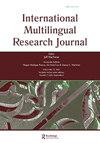打破封面:教师教育研究和批判性多语制的理论和定义清晰度
IF 2.1
1区 文学
Q2 EDUCATION & EDUCATIONAL RESEARCH
引用次数: 0
摘要
在这篇评论中,我对本特刊中的文章进行了反思,并提出了两个问题:(1) 作为批判性学者,我们永远无法完全理解多语制或教师教育的哪些方面?本文章由计算机程序翻译,如有差异,请以英文原文为准。
Breaking cover: theoretical and definitional clarity in teacher-education research and critical multilingualism
In this commentary, I reflect on the articles in this special issue to ask two quesitons: (1) what aspects of multilingualism or teacher education will we as critical scholars never fully understan...
求助全文
通过发布文献求助,成功后即可免费获取论文全文。
去求助
来源期刊
CiteScore
4.10
自引率
4.80%
发文量
19
期刊介绍:
The International Multilingual Research Journal (IMRJ) invites scholarly contributions with strong interdisciplinary perspectives to understand and promote bi/multilingualism, bi/multi-literacy, and linguistic democracy. The journal’s focus is on these topics as related to languages other than English as well as dialectal variations of English. It has three thematic emphases: the intersection of language and culture, the dialectics of the local and global, and comparative models within and across contexts. IMRJ is committed to promoting equity, access, and social justice in education, and to offering accessible research and policy analyses to better inform scholars, educators, students, and policy makers. IMRJ is particularly interested in scholarship grounded in interdisciplinary frameworks that offer insights from linguistics, applied linguistics, education, globalization and immigration studies, cultural psychology, linguistic and psychological anthropology, sociolinguistics, literacy studies, post-colonial studies, critical race theory, and critical theory and pedagogy. It seeks theoretical and empirical scholarship with implications for research, policy, and practice. Submissions of research articles based on quantitative, qualitative, and mixed methods are encouraged. The journal includes book reviews and two occasional sections: Perspectives and Research Notes. Perspectives allows for informed debate and exchanges on current issues and hot topics related to bi/multilingualism, bi/multi-literacy, and linguistic democracy from research, practice, and policy perspectives. Research Notes are shorter submissions that provide updates on major research projects and trends in the field.

 求助内容:
求助内容: 应助结果提醒方式:
应助结果提醒方式:


